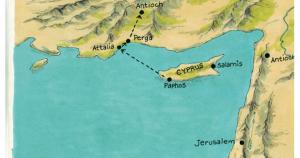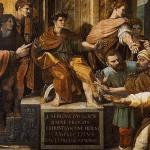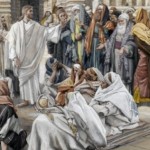 Acts 13:13-25
Acts 13:13-25
Tucked inconspicuously in today’s lesson, off in the very edges of the picture, we see an incident in the life of a young man. The lesson has 2 main foci, both of which are rather large objects. The first is the continuing missionary journey of Paul and Barnabas, as they make their way Cyprus to the heart of Asia Minor. The second is Paul’s re-telling of God’s dealing with His people from the Exodus until John the Baptist.
But there, right there in the second half of one verse, verse 13, we catch a blur. Did you see him? It’s John Mark. Back in 12:25 we first heard that Paul and Barnabas had taken John Mark with them. He is with them at Antioch, and so he would have witnessed the Holy Spirit setting apart Paul and Barnabas. He goes with them to Cyprus (see 13:5), and would have witnessed firsthand the battle with Elymas and Paul’s striking him dumb.
Who is this young man John Mark, who is privileged to make history with Paul and Barnabas, as they set sail to convert the Gentiles? He came from a believing family, for it was at his mother’s house that the believers in Jerusalem are gathered to pray when Peter is thrown into prison in Acts 12.
And so we come to Acts 13:13, where we read, simply: “and John, departing from them, returned to Jerusalem.” Nothing more. It seems like an extraneous detail, until we continue on to Acts 15:37-39 and we read: “Now Barnabas was determined to take with them (to the cities they had previously visited) John called Mark. But Paul insisted that they should not take with them the one who had departed from them in Pamphylia, and had not gone with them to the work. Then the contention became so sharp that they parted from one another. And so Barnabas took Mark and sailed to Cyprus.”
We’ll never know the precise reason Mark turned back. Maybe he was homesick. Maybe he couldn’t stomach the Gentiles. Maybe he was cowardly. Paul didn’t want to take him in Acts 15 because of his past track record, and throughout the letters of Paul we find that many of his companions abandon him. Barnabas, being a cousin of Mark (Colossians 4:10), wants to take him. From Acts 15 on, Mark goes with Barnabas, and we hear little more about him.
Regardless of the reason for his departure, Luke’s understated description of Mark’s departure haunts me: saying simply that he “had not gone with them to the work” (Acts 15:38). It reminds me of the people who abandoned Paul later, especially at the end of his life. It reminds me of how the disciples abandoned Christ before His Crucifixion. And it reminds me of how alone and abandoned I feel sometimes and incites me to never want to abandon my Lord or His work. What a serious charge, to think that any of us had abandoned the ministry, and to have that assessment recorded for history!
Think about your life. Could it be said of you, where you are now, that in any way you have abandoned the ministry to which God has called you? It’s not likely that you are a missionary in a foreign land, but to what has God called you? To disciple your children? To wash the feet of the saints? To speak of your Lord with your relatives and neighbors? To keep holy in this dark and dying world? To greater faithfulness, listening at His feet?
Mark’s turning back is a warning to us all.
But thank God that Mark’s story didn’t stop there. Actually, it gets does get worse before it gets better, because Mark’s cowardice or selfishness caused a division two years later between Paul and Barnabas (Acts 15:39). Those who turn from the faith or those who go AWOL in God’s army do more harm to the Body of Christ than they know. And those who say they are of Christ but do not do the work of Christ they know they should do help make the Body sick or weak.
But what we mean for selfish purposes, God can still bless. Out of this division of the Dynamic Duo come not one but two missionary teams. And the division between Mark and Paul is not eternal: it didn’t even last to the end of Paul’s life.
In Colossians and Philemon, we first hear a very quiet but very dramatic change in Mark. In Colossians 4:10-11, Paul calls John Mark a fellow worker and comfort to him. Now, 11 years later, Paul can say that Mark, along with Luke, is one of his “fellow laborers” (Philemon 23). We don’t know what happened in young Mark’s life, except to say that he had been restored to the ministry of the gospel by the grace of God.
But the best is saved for last, for here in 2 Timothy 4:11 Paul writes to Timothy: “Get Mark and bring him with you, for he is useful to me for ministry.” How would you like to have that recorded of your life – that you were useful in ministry to a great apostle? What about listening for the words from your Master: “Well done, thou good and faithful servant”? These are the words we should labor to hear when at the end of our lives, and at the end of each day.
Mark’s story, after we have stitched it together, is a story of redemption. Mark had turned back, but that was not to be the mark of his life, for he also returned to the ministry. We learn from Mark’s life that faith and faithfulness are processes that in this crazy, upside down, embattled world don’t always march in a straight formation. A single step in the wrong direction doesn’t, by itself, undo us, no matter how large. But a lifetime of drifting or wandering in the wrong direction is deadly. At any moment, no matter how much we’ve screwed up in the past, there is hope of redemption, if we’re serious about returning to the Lord and His ministry.
God’s restoration of John Mark is one of the greatest success stories of the Bible. This young man, who might have been the young man who ran away naked when Jesus was arrested, is not only restored to St. Paul’s good graces: he was privileged to be one of only four Gospel writers. This same Mark, who had abandoned Paul when younger, is St. Mark, the writer of a Gospel of Jesus Christ. He was the companion of St. Peter, who calls him his son (1 Peter 5:13). He is also believed by some to be the first Pope of Alexandria by both the Coptic Orthodox Church and the Greek Church of Alexandria.
Every time we read his Gospel or hear his name, we should be reminded of the grace of God in his life and ours.
Prayer: O Almighty God, who hast instructed thy holy Church with the heavenly doctrine of thy Evangelist Saint Mark; Give us grace that, being not like children carried away with every blast of vain doctrine, we may be established in the truth of thy holy Gospel; through Jesus Christ our Lord. Amen.
Points for Meditation:
- In what ways might you be retreating from the ministry to which God has called you? Consider that God is in the business of redemption.
- Meditate on examples of those who have persevered in the ministry, despite hardships.
- What is your story of redemption? In what ways have you wandered and yet the Good Shepherd has brought you back?
Resolution: I resolve to make one conscience turn back to the ministry of the Lord today, no matter how small.
Antioch Pisidia Map – Creative Commons Attribution-Share Alike 3.0 Unported license











